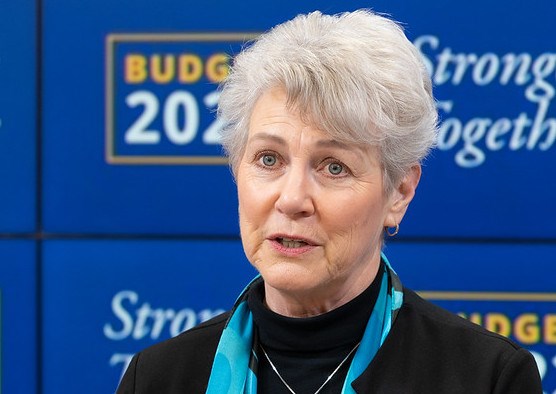The BC NDP government insists its decision to force Surrey to leave the RCMP and create a new municipal police force is 100 per cent, ironclad, absolutely, immovably final. So why then is it in the middle right now of conducting detailed riding-by-riding polling in the city about whether it made the right call?
Finance Minister Katrine Conroy didn’t want to answer that, or really any other questions about government polling, during her ministry’s recent estimates at the legislature. She gave the bare minimum answers, executing a stiff-arm to the Opposition on the issue, and by extension the public.
“Yes, there's research happening now, but it's in the field so we don't have results,” she said.
The City of Surrey and NDP government are currently duking it out in court, with Surrey challenging Solicitor General Mike Farnworth’s decision in 2023 to force the transition to the new Surrey Police Service. Farnworth has said the decision won’t be reversed, even if he loses the court case, and that the SPS will become the police force of jurisdiction in Surrey on Nov. 29.
“Is the minister, then, saying that the reason they're back out in the field for Surrey policing — despite several repeated statements that the transition is happening, that there's money in the budget identified for the transition to happen — is that, depending on the results of the poll at the end of May, that decision could be reversed then?” asked BC United labour critic Peter Milobar.
“The answer is no,” replied Conroy.
“Well, then it's a shame that we're spending money on polling that will essentially be irrelevant, because the decision has already been made, and the transition is going to happen, regardless what the poll actually says,” shot back Milobar, running verbal circles around the intransigent minister.
Perhaps the new polling is a prelude to B.C. offering a new financial bailout to Surrey.
Mayor Brenda Locke rejected a $250-million aid package last month, which Farnworth described as the “final offer.” But, the money was also more than the previous “final offer” the government had made last year.
Another rationale might be to gather valuable neighbourhood-by-neighbourhood data on the policing issue that the NDP can use for each of Surrey’s 10 provincial ridings.
“The only reason you would do this, if Farnworth and the premier have absolutely no intention of going back, is so they can try and micro-target, riding by riding, what each person’s message is going to be on the whole debacle,” Milobar said in an interview.
That certainly seems like a plausible reason. Though, it would be a highly inappropriate expenditure of public money.
The government is not supposed to use taxpayer funds to do polling for partisan purposes, especially five months before the October provincial election.
“A lot of the neighbourhoods conveniently align with a lot of the naming of provincial ridings in the upcoming election,” Milobar said.
“I'll give an example. There's a Fleetwood breakdown, a Newton breakdown, a South Surrey breakdown, a Guildford breakdown, a Cloverdale breakdown and a Whalley centre breakdown.
“I'm just wondering: why the need to get into that granular, neighbourhood detail, if it's really about the policing for the whole community?”
Conroy defended the move as a way to gauge public sentiment in each of Surrey’s unique cultural and ethnic communities.
“There also are variations in communities that are utilized, such as socioeconomic, age, income, ethnicity. …. [in which] they're all factors that are important in getting a full picture of the communities individually and communities as a whole when doing research,” she said.
This is not the first time the B.C. government has polled on Surrey policing.
It conducted a similar poll in May 2023, finding a plurality of respondents thought the government’s decision to replace the RCMP with the SPS was the wrong move, according to polling data obtained by journalist Bob Mackin under Freedom of Information.
That information was in Premier David Eby’s back pocket when he held a flurry of behind-the-scenes meetings with Locke last year, subsequently offering two financial aid packages for Surrey.
The goal is to have this most recent data complete by the end of May, said Conroy.
At which point anyone who wants to see it will have to pay $10 and apply through the Freedom of Information process to get access, explained Conroy. Even then, much will be redacted as confidential advice to cabinet, she added.
The FOI process takes many months — certainly beyond the Oct. 19 provincial election. Which, of course, is the point. In the meantime, New Democrats will be quietly working up election strategies based on this information, paid for out of public funds.
Rob Shaw has spent more than 16 years covering B.C. politics, now reporting for CHEK News and writing for Glacier Media. He is the co-author of the national bestselling book A Matter of Confidence, host of the weekly podcast Political Capital, and a regular guest on CBC Radio.







